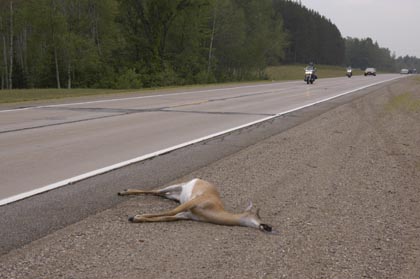A broader deer hunt would save fenders and feed the needy
Not even the father of Michigan's new roadkill law – State Sen. Darwin Booher of Evart – sees the law principally as a way to put meat on the supper table.
Booher, who represents a dozen counties in northern Michigan, said he was motivated primarily by constituents who wanted to claim highway carcasses for purposes other than venison stew – as bait for varmint hunting, for example, or for the hides that might be salvaged and put to good use. That's not to say that road kill is never fit for human consumption. Under the right circumstances – timeliness, for one thing – certain parts of a deer, for example, are, indeed, fit for the freezer. Especially for somebody who does his own butchering, for his personal consumption.
However, as one who volunteers with a program that distributes donated venison to Michigan food banks and soup kitchens, I know that, more often than not, the amount of meat that can be salvaged from vehicle-struck deer is not worth the cost of professional processing. And food banks can't accept meat unless it's processed by professionals, subject to inspection.
Booher also had another target in mind with his legislation: the silly, illogical, wasteful regulations that governed road kill before the new law took effect last September.
While the current law addresses all manner of critters – from beavers to bears – deer represent the most conspicuous carnage on Michigan's highways, and the biggest waste of potential. Previously, it worked liked this: A driver who wanted to claim road kill, but didn't possess a hunting license, had to obtain a salvage tag from a cop or conservation officer at the scene of the collision.
Naturally, driving to deer-vehicle accidents for the purpose of issuing salvage tags was never a top priority for cops and C.O.s; on the contrary, It was a waste of time and resources, for the officers and for the motorist forced to wait roadside for an officer to show up. Now, the whole thing can be taken care of with a phone call to the state Department of Natural Resources, or the local police, or through the DNR's website. The driver unfortunate enough to hit the deer, by the way, has priority in claiming it.
The new law is clearly an improvement, as far as it goes. But there is a better way to take advantage of the healthy, abundant, renewable protein running wild in Michigan's fields and forests: Harvest it before it becomes roadkill.
The program I volunteer with, HOPE (Help Other People Eat), distributes donated venison to soup kitchens and food banks in mid-Michigan. HOPE, founded and operated by Williamston retiree Tom Cullimore, is a model of simplicity and efficiency. Area hunters donate deer by delivering the fruits of a successful hunt to one of a half-dozen meat processors who have agreed to participate. They process the deer at a discount rate, turning the venison into one-pound packages of tasty, lean, dioxin-free ground meat that is as versatile as ground beef. Ground venison is perfect for chili, spaghetti, tacos, meatloaf and any recipe that calls for ground beef.
Cullimore pays for the processing with cash donations to HOPE, then delivers the frozen packages to organizations that feed the needy. Meat is always tough to come by for food banks and the people who run them are always glad to get the venison. So are the clients. I've heard more than one director say that some of the people they serve actually prefer ground venison over ground beef.
There are similar efforts throughout Michigan. In Meridian Township, for example, the suburban deer herd – unhunted and living too well off a smorgasbord of landscape greenery – was out of control. Township officials recruited archery hunters to kill deer in limited areas of the township. One result of that effort: more than 1,500 pounds of venison donated to the Okemos and Haslett Community Church Food Banks in 2014 alone.
The Meridian hunt came with residual benefits. Township police are reporting a drop in car-deer accidents and those responsible for keeping Michigan's highways clean - county road commissions, in most cases - can turn their attention to more productive business. And presumably fewer expensive landscape bushes and flowers are being ravaged.
Utilizing roadkill is OK; minimizing it is better.
See what new members are saying about why they donated to Bridge Michigan:
- “In order for this information to be accurate and unbiased it must be underwritten by its readers, not by special interests.” - Larry S.
- “Not many other media sources report on the topics Bridge does.” - Susan B.
- “Your journalism is outstanding and rare these days.” - Mark S.
If you want to ensure the future of nonpartisan, nonprofit Michigan journalism, please become a member today. You, too, will be asked why you donated and maybe we'll feature your quote next time!


 Poor Bambi, but lucky for the person who can harvest the venison. Of course, if more deer were harvested by hunters, fewer drivers would have this experience. (Photo by William Lee via Flickr; used under Creative Commons license)
Poor Bambi, but lucky for the person who can harvest the venison. Of course, if more deer were harvested by hunters, fewer drivers would have this experience. (Photo by William Lee via Flickr; used under Creative Commons license)